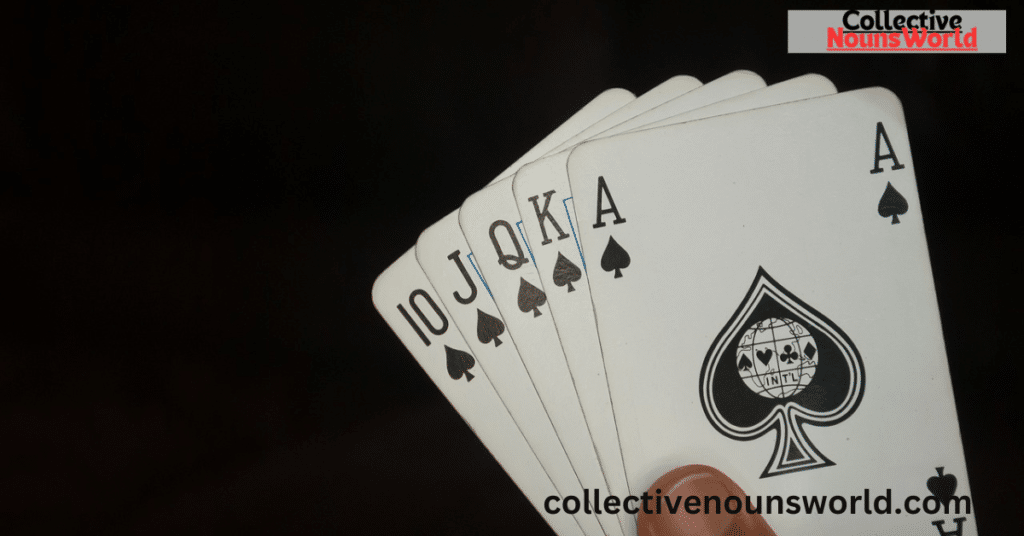Have you ever wondered what to call a group of cards? Whether you’re a card game enthusiast or just curious about language quirks, understanding collective nouns for cards can enrich your vocabulary and make your conversations more colorful. In this article, we’ll dive into the fascinating world of card-related collective nouns, exploring their origins, usage, and variations. Let’s shuffle through the deck of linguistic knowledge and deal out some interesting facts!
The Basics: Defining Collective Nouns
Before we get into the specifics of card-related terms, let’s lay our cards on the table and define what a collective noun is.
What is a Collective Noun?
A collective noun is a word used to describe a group of people, animals, or things. It’s a linguistic tool that allows us to refer to multiple items as a single entity. For instance, we say a “flock of birds” or a “bouquet of flowers.” These terms add precision and flavor to our language, painting vivid pictures with just a few words.
Read more The Blooming World: What is the Collective Noun for Flowers?
Common Collective Nouns for Cards
When it comes to cards, several collective nouns are commonly used. Let’s explore the most frequent ones and their nuances.
Deck of Cards
The term “deck of cards” is perhaps the most widely recognized collective noun for a complete set of playing cards. A standard deck typically consists of 52 cards, not including jokers.
Pack of Cards
“Pack of cards” is often used interchangeably with “deck of cards.” This term is more common in British English but is understood globally.
Hand of Cards
A “hand of cards” refers to the cards held by a single player during a game. The number of cards in a hand can vary depending on the game being played.
Pile of Cards
“Pile of cards” is a more informal term, often used to describe a disorganized group of cards, such as those left after shuffling or discarding.
Suit of Cards
A “suit of cards” refers to one of the four categories in a standard deck: hearts, diamonds, clubs, or spades. Each suit typically contains 13 cards.
To summarize these common terms, let’s look at this table:
| Collective Noun | Definition | Example Usage |
| Deck of Cards | A complete set of playing cards | “Shuffle the deck before dealing.” |
| Pack of Cards | Synonymous with deck, more common in British English | “I bought a new pack of cards for game night.” |
| Hand of Cards | Cards held by a player during a game | “She had a winning hand of cards.” |
| Pile of Cards | An informal term for a disorganized group of cards | “The pile of cards on the table needs sorting.” |
| Suit of Cards | One of the four categories in a standard deck | “Hearts is my favorite suit of cards.” |
Historical and Linguistic Background
The use of collective nouns for cards has evolved alongside the history of card games themselves. Playing cards have been around for centuries, with their origins tracing back to 9th century China. As card games spread across cultures and continents, so did the language used to describe them.
The term “deck,” for instance, has nautical origins. It’s believed to have come from the Dutch word “dek,” meaning a ship’s platform. This connection might stem from the fact that card games were popular among sailors during long voyages.
Read more Exploring the Collective Noun for Soldiers:
Examples and Scenario-Based Usage
Let’s look at how these collective nouns are used in everyday language:
- “Can you pass me the deck of cards? I want to practice my shuffling technique.”
- “In poker, each player is dealt a hand of cards at the beginning of the round.”
- “After the game, we left a messy pile of cards on the table.”
- “She sorted the cards by suit, creating four neat stacks.”
These examples show how collective nouns for cards naturally fit into our conversations about card games and related activities.
Regional Variations and Alternatives
While “deck” and “pack” are widely used, some regions and specific card games have their own unique terms. For instance:
- In some parts of the UK, you might hear “set of cards” used instead of “deck.”
- Bridge players often refer to a “book of cards” when discussing a specific number of tricks.
- In certain games, a partial set of cards might be called a “shoe,” especially in casino settings.
These variations add richness to the language of card games and reflect the diverse cultures and traditions associated with them.
Fun Facts and Trivia
Did you know that the collective noun for a group of card players is often called a “table” or a “hand”? For example, “A table of bridge players gathered for the tournament.”
Here are some other interesting tidbits:
- The term “face cards” collectively refers to the Jack, Queen, and King in each suit.
- “Trump cards” is a collective term for cards of the suit chosen to rank above the others in certain games.
- In tarot, a full set of cards is sometimes called a “tarot deck” or “tarot pack.”
Read more The Wondrous World of Rats: Discovering Their Collective Names
Practical Applications: Using Collective Nouns for Cards
Understanding these terms isn’t just about winning trivia nights. It can enhance your communication in various scenarios:
- Writing game instructions
- Discussing card game strategies
- Describing card tricks or magic performances
- Creating engaging narratives involving card games
By using the correct collective nouns, you add precision and flair to your language, making your descriptions more vivid and accurate.
The Importance of Collective Nouns in Language
Collective nouns, including those for cards, play a crucial role in our language:
- They provide concise ways to describe groups.
- They add color and variety to our expressions.
- They reflect cultural and historical aspects of language evolution.
- They help in creating more precise and vivid mental images.
Learning and using these terms correctly can significantly enhance your communication skills, especially in contexts related to games, gambling, or any card-related activities.
Read more The Amazing World of Cows: Discover Collective Noun for Cows
Conclusion:
In this article, we’ve shuffled through the deck of collective nouns for cards, revealing the rich tapestry of terms used to describe these everyday objects. From the standard “deck of cards” to the more specific “suit of cards,” each term adds its own flavor to our language.
Understanding and using these collective nouns correctly can enhance your communication, whether you’re writing about card games, discussing strategies, or simply enjoying a casual game with friends. It’s a small linguistic detail that can make a big difference in how clearly and colorfully you express yourself.
So, the next time you sit down for a game of poker, bridge, or any card game, remember the power of these collective nouns. They’re not just terms; they’re keys to unlocking more precise and engaging communication about the world of cards.
We’d love to hear from you! Do you know any unique collective nouns for cards used in your region or favorite card game? Share your thoughts in the comments below, and let’s keep the conversation going!
Examples and Usage in Sentences
Here’s a quick reference list of how to use these collective nouns in sentences:
- The dealer shuffled the deck of cards before the game began.
- She fanned out her hand of cards, revealing a royal flush.
- After the party, we found piles of cards scattered around the room.
- Each suit of cards in a standard deck contains thirteen cards.
- The magician asked a volunteer to select a card from the pack.
- In blackjack, the dealer draws cards from a shoe containing multiple decks.
Remember, using these terms correctly can make your card game discussions more precise and engaging!

Luna Jasper is an experienced blogger with a passion for language and grammar. At **Collective Nouns World**, she shares her expertise in exploring the fascinating world of collective nouns, making learning both engaging and fun. With years of writing and research under her belt, Luna’s insightful articles help readers understand and appreciate the English language.







